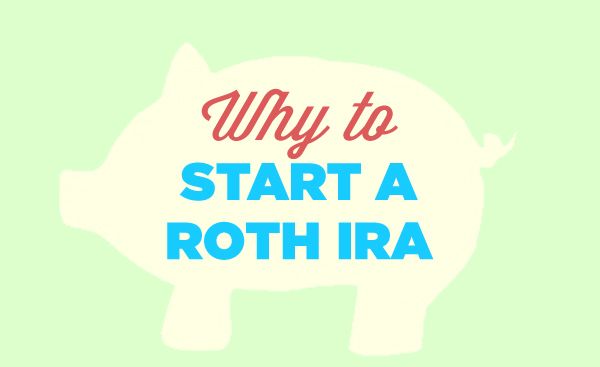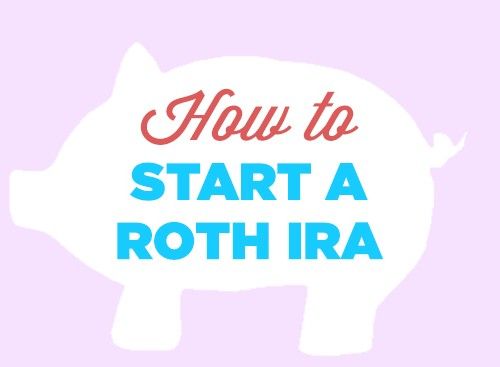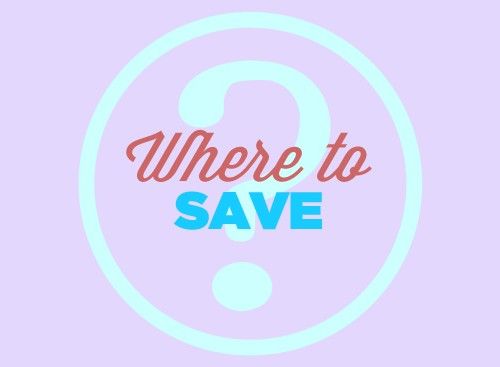If I could travel back in time as my current self and visit my then 18-year-old self, this is the wisdom I would dispense:
- Stop using MySpace. It’s dumb, and you’re going to feel dumb that you ever had an account.
- If you wear that puka shell necklace one more time, I’m going to punch yourself… myself in your… my face.
- Take some of that Jamba Juice income and open a Roth IRA. NOW!
It’d be an awkward, embarrassing encounter, but it’d all be worth it if it meant meeting Mr. Roth in 2003 instead of last year. In 2013, I rolled over my former employer’s 401k into a Roth IRA, and also opened up and maxed out brand spanking new accounts on New Year’s Eve. That should give you a really good idea of how these wild and crazy twenty-somethings party!
Roth IRAs are actually a lot less intimidating than they sound. And while there’s really not a lot to opening an account and jumping into the Roth-inator (which is the name I would have gone with), I figured it’d help if I first sold you on why you should open one. So let’s jump right in.
1. Because you’re going to get old
It’s a rough fact of life, but this near-mediocre physique will one day be even more mediocre and wrinkly and stretchy. And with that elderly age will (hopefully) come retirement. Most retirees will need to have saved 8x their final salary in order to have enough money to last their final 25 years. That’s a lot of dough. For those of us in our 20’s, 30’s, and 40’s, the time to get ahead is now. A Roth IRA is a great retirement investment vehicle.
2. No taxes on withdrawal
Unlike 401k’s and traditional IRAs, you invest already-taxed money in Roth IRAs. That means that at the time of retirement, you’ll be able to withdraw everything tax-free — clean and simple. This is usually advantageous for younger folks who are currently in lower tax brackets and will most likely be taxed at a higher percent at retirement age.
3. Early withdrawals are cool with Roth
Many retirement vehicles carry stiff penalties for withdrawing before you reach 59½… why. Why the half birthday?! So dumb. Anyway, what’s rad about the Roth IRA is that you can always take your principal (the money you invested, minus gains/losses) out free of penalty and tax. And while you probably wouldn’t want to touch the money you put in there, it’s nice knowing you can get it back whenever you want. There’s also no penalty for first-time homebuyers who wish to withdraw their earnings to put toward their home purchase.
4. Compound interest (aka money babies)
Joanna has explained this masterfully before, so I’ll just let her do it again:
“The earlier you jump in, the more money you stand to gain in the long run, thanks to a little principle called compounding interest. The interest that you earn starts earning its own interest. Basically all your money starts having babies. And their babies have babies. And the longer time you give it, the more babies there will be. The key is duration of time. I’d show you a graph with a gradual incline that suddenly spikes upward, but I’m not very good with Excel. So just pretend that you see it in your head. And trust me that lots of money babies are a good thing.”
So to summarize… Roth IRAs are a great way to invest for retirement and they’re forgiving should you ever need early access to the money. Easy stuff, right? So now that you know the why, it’s time to read our part two that covers how to open a Roth IRA.
Anyone else have any perks or Roth IRA experiences to share? Questions? Does anyone know whether you get any special bonuses if your name is “Roth”?





18 Comments
Right now my retirement accounts consist of an employer contributed pension, and an employer provided 401K plan.
The pension has a good amount of funds in it, but my employer no longer contributes to it as they have moved fully over to the 401K plan.
Once we finish our debt management plan at the end of February, starting up a ROTH IRA is on the top of our list as we begin to play catchup with our retirement savings.
A pension?! Unicorns do exist! That’s awesome that you were around while the pension was still around. And congrats on nearing the end of your debt management! What better way to celebrate the death of your Debt Monster than by birthing a Roth IRA. 🙂
Thank you for this series! Very much looking forward to part 2 – I know Roth’s are good, Roth’s are our friend, we should have a Roth’s….but how does one actually go about setting one up? Is it just a regular saving account at the local bank that you name “Roth” or is it something you have to go to an investor and get your lawyer and tax accountant involved with (Or somewhere in between)? Also is it something you can set up yourself or does your work need to be involved?
I’m figuring you’ll cover those topics but just in case those are some of my specific questions. 🙂
Glad you asked ’em, and hopefully we covered off on all of them. Hopefully after reading through today’s “how” post, you’ll feel a little more confident moving forward, but feel free to lean on a financial advisor, trusted financial-geek family member/friend, or shoot us an email. We probably won’t know the answer, but we can send you lots of animated GIFs instead. 🙂
I knew a Jeff Roth…I don’t think he got any special bonuses.
It’s hard for me to start a retirement account when I’m dealing with capitalized interest on my student loans. Instead of my money growing, my lenders profits are growing, at my expense.
Jeff didn’t get any special bonuses… that he told you about. I think I’m on to this Roth-bonus conspiracy.
Ugh, debt is the worst. Everyone has different philosophies on what they’ll do in regarding to investing/retirement/etc., but I think you’re making the right call. Keep at it and you’ll be opening a Roth and generating money babies in no time.
Too many good things about Roth IRAs not to share:
1. You can contribute for the 2013 tax year up until April 15th of this year, so if you haven’t done it yet, it isn’t too late!
2. You mentioned being able to withdraw your principle without penalty. For anyone just starting to get their financial house in order, you don’t have to decide between emergency savings vs. retirement. Put your emergency funds into an Roth IRA with lower risk investments. If you need funds for that future “emergency” they come out penalty free. If you end up not needing the funds, then you’ve already started contributing to your retirement. and haven’t missed out on the opportunity for years past.
3. Any IRA contribution has to come from money “earned” that year. However, there is such a thing as a Spousal (Roth) IRA for all those stay at home mom’s. A married couple with a stay at home spouse can still contribute $11,000 for the year 2013.
4. Unlike traditional IRAs there are income limits to Roth… sort of. If you are single and make 127k the IRS wants you to think can’t contribute to a Roth IRA (married/joint limit is higher). However, you can still contribute the maximum to a traditional IRA and then roll-over those funds into a Roth IRA account as long as you pay the appropriate taxes–remember Roth = after-tax contributions. This loophole is perfectly legal and essentially nullifies any income restrictions.
5. Mutual funds and ETFs are wonderfully easy, simple and the right investment vehicles for most. However, if you feel a need to diversify outside of the stock market you can always roll-over your Roth funds into a self directed IRA. This type of account allows you to invest your retirement dollars in non-traditional ways: real estate, metals, notes, businesses, etc. This option isn’t for everyone, but it is a wonderful tool for added flexibility and diversification.
Sorry for the length; done blabbing.
You win the award for most helpful and insightful blabbing of 2014. Congratulations, T.
I especially love #2. Oftentimes, I think people see emergency funds as a stack of cash they need to store in a shoebox in their closet. Put that money to work! Sure, there’s a little risk and it might not be AS liquid, but the Roth IRA emergency fund is a pretty great option.
And I didn’t realize the loophole you pointed out in #4. Minus the added reported income/taxes to be shelled out that year, it’s a great option once we’re all rolling in the big green.
Hi guys. Well another chilly winter day here in Canukland today (-22C / or -8F for you guys).
brrrrrrr !!!! 🙂
I realize that today’s blog posting refers to you folks in the US but we Canadians have similar investment tools. That said, I thought that it might be informative to post some links comparing yours to ours, in case some of your readers have dual citizenship. So here they are:
canadian rrsp vs us 401k –
http://www.moneysmartsblog.com/canadian-rrsp-vs-us-401k-comparison
canadian tfsa vs us roth ira –
http://www.moneysmartsblog.com/canadian-tfsa-vs-american-roth-ira
Our snowy 31F conditions sound like summer compared to your current Arctic state.
Thanks for adding those links to the conversation. We do see a healthy amount of Canadian traffic to the site, so I’m sure this will be helpful for the Amerinadian crowd. 🙂
How did you roll your 401k into a roth IRA? Shouldn’t it have gone into a traditional IRA? Or did you pay the taxes on the conversion?
Uncle Sam will be counting that newly Roth-ed money from my 401k as income this year, so yes, I’ll have to pay taxes. BUT, I’ll gladly pay those taxes now at a lower tax bracket, assuming I’ll get to take that money out tax-free later in life when I’ll likely be in a higher tax bracket.
It’s really hard for me to save for retirement when I am trying so desperately to not get any more debt while finishing up my bachelor’s degree. I look forward to finishing my degree so that I can start saving for the future.
Debt and school and all that stuff generally gets in the way of the fun stuff, but that time will come. And it will be glorious.
Haha, this is perfectly timed with my comment from your resolutions post! Roth IRAs sound like the bomb.com and per a Fidelity advisor, they are totes magotes the best. Next pay check, imma come atchu Roth IRA.
I just visited the bomb.com and I can verify that Roth IRAs were at the top of the list. I’ll let Mr. Roth know he can expect you soon.
[…] Why to Start a Roth IRA (Part 1) and How to Start a Roth IRA (Part 2) via Our Freaking Budget because financial stuff might not be the sexiest thing to learn about, but it’s super important. I discovered this blog over the past couple months and have learned a lot from Joanna and Johnny. I’m fortunate to have a retirement account through my current employer, but I know that the more I can learn, the better off I am in the long run. Money is confusing, yo. […]
[…] the way they break down all things finance for you. I’ve been looking into Roth IRA funds so this is a helpful post on why they are so awesome. (J & J also just recently published a post on how to do some […]